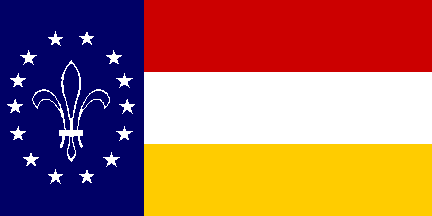 zachary harden
zachary harden
Keywords: expo 04 | st louis |
Links: FOTW homepage | search | disclaimer and copyright | write us | mirrors

Last modified: 2023-06-03 by  zachary harden
zachary harden
Keywords: expo 04 | st louis |
Links: FOTW homepage |
search |
disclaimer and copyright |
write us |
mirrors
This flag was used during the Fair held in St. Louis, Missouri in 1904.
Called the "The Louisiana Purchase Exposition" the event was celebrated by a
special flag. The information is from "The St. Louis World's Fair" by Margaret
Johanson Witherspoon (St. Louis MO, The Folkstone Press, 1973, p.93) but I
cannot find any actual evidence the fleur-de-lis and stars were ever gold. In
fact as Richard O’Keefe reported in 2007, they are always shown as white.
Dave Martucci, 30 November 1999
Also noteworthy is that the first modern Olympics Games in the Western
Hemisphere were held in St. Louis in 1904 in conjunction with and immediately
adjacent to the Exposition.
Bob Hague, 22 July 2003
I have what appears to be a 1904 St. Louis world's fair flag approximately 6
foot long. It matches the flag of the 1904 St. Louis World's Fair flag shown
here, except, it has white stars and ensign (instead of yellow) on a blue
background.
Richard O'Keefe, 6 March 2007
The Republic of St. Louis, Missouri, 9 May 1902, page 5, says flag designs
were submitted by The Artists Guild of St. Louis through Professor Halsey C.
Ives, Chief of the Art Department to the Corps of Design in the Department of
Works, which bureau made some preliminary changes or “improvements” to the
designs as submitted and had the top two made up in bunting.
The two
flags are described as:
Star for Every Purchase State
 image by Dave Martucci, 23 January 2019
image by Dave Martucci, 23 January 2019
[Note the number of stars had not yet been
settled but I have shown 14, the number ultimately settled on. Same with the
second flag.]
It has a blue field next the flag staff, forming one-fourth of the
flag. The center of the blue field carried a giant white fleur-de-lis. The
greater part of the flag is divided longitudinally into three broad stripes of
equal size, red, white and yellow, in the order given. The central white stripe
is emblazoned with blue stars, one of each State and Territory in the Louisiana
territory.
The exact number of stars to be placed in the flag will be
left for the Executive Committee to determine. There is a question whether the
proper number is fourteen, sixteen or seventeen. This uncertainty arises out of
the doubt as to whether the States in the extreme northwest of the United States
should or should not be included in the purchase. It is likely that the record
of the purchase at Washington will be consulted before this historical phase is
settled.
The colors used in the flag are those selected by the Committee
on Ceremonies. They include the colors of the flags of all the countries which
have at various times possessed the Louisiana Territory—Spain, France and the
United States. The fleur-de-lis is the conventionalized flower, symbolical of
France, the country that transferred the Territory to the United States. In the
heraldry of the American flag, the star stands for a State, and this symbolism
has been followed by the designers. Red, white and blue are the tri-colors of
the French and American nations. Red and yellow is the color scheme of Spain.
Design of Other Flag
 image by Dave Martucci, 23 January 2019
image by Dave Martucci, 23 January 2019
In the second,
and what is deemed the least acceptable of the two designs, the entire flag is
blue, except for a broad cross which divides the whole field into equal
sections. The horizontal arms of the cross are yellow, while the vertical bar is
red. A huge white fleur-de-lis at the intersection of the cross, outspreads its
figure over the center of the flag. The fleur-de-lis is surrounded by a circle
of white stars, which stud every color in the ensign.
The color symbolism is the same as the first flag. It appears that
the decision on which flag, scheduled for 9 May 1902 ended up being a
combination of both designs.
On 14 February 1903, a patent application
was made by Walter B. Stevens, of St. Louis, Missouri, Assignor to Louisiana
Purchase Exposition Company, a Corporation of Missouri for the final design. It
was awarded as Design Patent number 36,273 on 7 April 1903 for a term of 3Ҫ
years. The drawing that accompanied the application is a bit different than the
flags that ultimately saw use:
 image by Dave Martucci, 23 January 2019
image by Dave Martucci, 23 January 2019
For one
thing, the patent drawing shows a flag that is very close to 1:2 in proportion
while actual flags of the day appear in the standard 2:3 or 3:5 proportions. The
blue field is to be about one-third the length of the flag. It has a thinly
outlined fleur-de-lis and an oval of stars, described in the Patent document as
“an elliptical figure formed of stars.” They all point up.
Actual flags
and images more often show the stars in a circle and pointing in various
different directions depending on who manufactured the flag and usually with
either the fleur-de-lis in outline similar to the patent design or a solid white
flower. Flags purchased for use by the Exposition appear to have the latter type
while many of the souvenir flags have the former. image by Dave Martucci, 23 January 2019
image by Dave Martucci, 23 January 2019
This flag is an
erroneous design. Interestingly, it is the design that was recently used for a
special occasion at Six Flags St. Louis in commemoration of the Expo!
Dave
Martucci, 23 January 2019